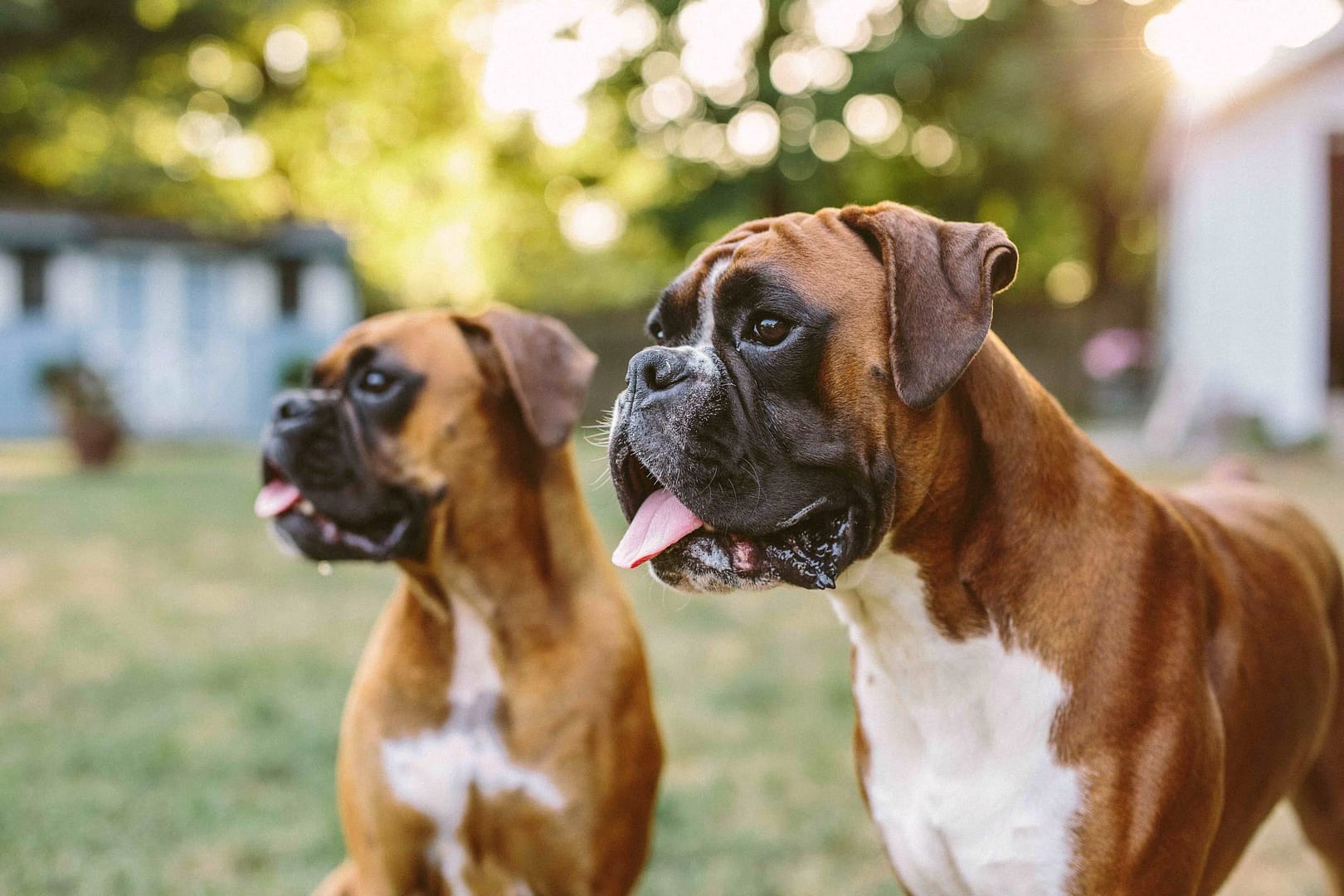Boxer: Energetic Companions for Active Families

Boxers are a remarkable breed known for their playful energy, intelligence, and unwavering loyalty. With their distinct muscular build, strong stature, and expressive face framed by short hair, they often capture the hearts of families seeking a lively and affectionate companion.
Originally bred in Germany for hunting and protection, this breed has a rich history contributing to its robust and adaptable nature.
These dogs thrive on physical activities, making them perfect for active households that enjoy outdoor adventures and playtime.
Whether it’s a game of fetch in the backyard or a run at the local park, these dogs are always eager to join in on the fun.
Their playful spirit is matched by their affectionate demeanor, and they are known to be great with children, making them an excellent choice for families.
When choosing a dog, it’s essential to consider the breed’s characteristics, needs, and temperament to ensure a harmonious fit with your family dynamic.
An active family can greatly benefit from the companionship of this breed, as they not only love to engage in play but also form strong, lasting bonds with all family members. They are protective yet gentle, making them both a wonderful playmate and a loyal guardian.
Furthermore, these dogs require mental stimulation and regular exercise to channel their energy positively, so incorporating training and socialization activities into their routine can enhance their well-being and strengthen their bond with their human companions.
Table of Contents
1. Characteristics of Boxers

General Physical Traits
These dogs are medium to large-sized, typically weighing between 50 to 80 pounds. They have a strong, muscular build that exudes power and agility. Their square-shaped head, distinctive underbite, and prominent jaw give them a unique appearance.
They have a short, sleek coat that comes in various colors, including fawn and brindle, often accompanied by white markings. Their expressive eyes and friendly demeanor enhance their charm, making them easily recognizable.
Temperament and Personality
Boxers are known for their playful, energetic, and affectionate nature. They are friendly with people and usually get along well with other dogs. Boxers are highly social animals that thrive on companionship and interaction.
Their loyal and protective instincts make them excellent family pets as they tend to bond closely with their human companions. However, they can sometimes be mischievous, so consistent training and boundaries are essential.
Intelligence and Trainability
Boxers are intelligent dogs that respond well to training. They are eager to learn and enjoy tasks that challenge their minds. Positive reinforcement methods work best for Boxers, making training a fun and engaging experience.
Early socialization and obedience training are vital to ensure they grow into well-mannered adults. Their high energy levels and curiosity mean that consistent training helps channel their enthusiasm into good behavior, making them adaptable members of any active family.
2. The Ideal Family Fit

How Boxers Bond with Children
Boxers naturally form strong bonds with children, making them excellent family pets. Their playful and gentle nature allows them to interact positively with kids, often becoming their best friends and playful companions.
Boxers are known for their patience, which means they tolerate the occasional roughhousing that comes with playtime. This bond encourages a loving, nurturing environment where children learn responsibility and empathy while caring for their furry friend.
Their Protective Instincts and Loyalty
Boxers are instinctively protective of their families, making them reliable guardians. Their loyal disposition ensures that they are always alert and ready to watch over their loved ones.
This protective nature gives families a sense of security, as Boxers will readily defend their homes and loved ones if they sense danger. Their deep loyalty to their human companions establishes a trusting relationship, which is essential in a family setting.
Adaptability to Family Life and Routines
Boxers are remarkably adaptable dogs that can integrate seamlessly into any family routine. Whether in a busy household or one that enjoys quieter days, Boxers adjust well to their surroundings.
They thrive on structure and can easily fit into various daily activities, whether it’s going for walks, participating in family outings, or relaxing at home. This adaptability makes them a perfect fit for active families, as they are eager to be included in every aspect of family life.
3. Exercise Needs and Activities

Daily Exercise Requirements
Boxers are energetic dogs that require a significant amount of daily exercise to stay healthy and happy. Ideally, they need at least 60 to 90 minutes of physical activity each day.
This can be broken up into multiple sessions, including walks, playtime, and structured activities. Consistent exercise helps to channel their energy and prevents behavioral issues that can arise from boredom.
Fun Activities Boxers Enjoy
Boxers thrive when engaged in fun activities that stimulate both their minds and bodies. They particularly enjoy games like fetch, where they can run and chase after the ball, as well as agility training, which challenges their physical abilities and intelligence.
Running alongside their human companions during outdoor activities or participating in dog sports can be a rewarding way for Boxers to express their energy and enthusiasm.
Benefits of Physical Activity for Both Dogs and Families
Regular physical activity provides numerous benefits for Boxers, including improved physical health, reduced anxiety, and increased mental stimulation.
For families, exercising with their Boxers fosters stronger bonds and promotes an active lifestyle. Going for walks or engaging in playtime together encourages family interaction and teamwork, creating cherished memories while ensuring that both pets and their owners lead healthier lives.
4. Training Tips for Family Life

Basic Obedience Training
Establishing basic obedience commands is crucial for a well-behaved Boxer.
Start with essential commands such as “sit,” “stay,” and “come.” Use positive reinforcement techniques, like treats and praise, to encourage learning.
Consistency is key; practice these commands regularly in short, engaging sessions to keep your Boxer interested and attentive. A well-trained Boxer not only enhances family interactions but also helps to create a safer environment.
Socialization with Other Pets and People
Socialization is a crucial aspect of training for Boxers, as it lays the foundation for their behavior and temperament.
It’s important to expose them to a variety of environments, people, and other animals from a young age to help them develop a balanced and friendly demeanor.
This early exposure not only builds their confidence but also helps them learn how to interact appropriately with different stimuli.
Arranging regular playdates with other dogs is a great way to facilitate socialization. Choose dogs that are well-behaved and compatible in size and energy level to ensure a positive experience.
Additionally, take your Boxer on outings to diverse locations, such as parks, pet-friendly cafes, or community events.
These outings allow them to experience different sights, sounds, and smells, which is essential for their development.
Engaging your Boxer in structured activities, like obedience classes or agility training, can also enhance their social skills. This exposure helps Boxers become well-rounded and confident, easing anxiety in new situations and promoting positive interactions with both humans and animals.
By prioritizing socialization, you’re setting your Boxer up for a happy and fulfilling life.
Teaching Children How to Interact with Boxers Safely
Educating children on how to properly interact with Boxers is vital for ensuring safety and fostering a positive bond between them.
Boxers are known for their energetic and playful nature, but without proper guidance, interactions can lead to misunderstandings or even accidents.
It’s important to teach children to approach the dog calmly, using soft voices and gentle movements, while also respecting the dog’s personal space, particularly when it is eating or resting.
Show them how to gently pet the dog, emphasizing the right areas to touch, like the back or sides, while avoiding sensitive areas like the face or tail.
Encourage children to observe the dog’s body language; for example, if a Boxer seems uncomfortable or backs away, they should understand it’s time to give the dog some space.
Discouraging any rough play is crucial, as such behavior could disturb or provoke the dog, leading to stress for both the animal and the child.
Reinforcing these guidelines not only helps to create a harmonious relationship between Boxers and children but also teaches kids valuable lessons about empathy, respect, and responsible pet ownership.
This approach enhances the overall family dynamic, allowing for joyful interactions that strengthen the bond between children and their furry companions. By fostering understanding and care, families can enjoy a safe and loving environment where both kids and Boxers thrive together.
5. Health Considerations

Common Health Issues in Boxers
Boxers are generally healthy dogs, known for their energetic and playful nature, but like all breeds, they are prone to specific health issues that owners should be aware of.
Some common concerns include hip dysplasia, a genetic condition that affects the hip joint and can lead to arthritis, heart conditions like dilated cardiomyopathy, which causes the heart to become enlarged and weak, and certain types of cancer, including lymphoma and mast cell tumors.
Understanding these potential health challenges allows owners to take proactive measures to monitor their pet’s health effectively. Regular observations of any changes in behavior, appetite, or energy levels are essential for catching potential problems early.
Additionally, routine veterinary check-ups, maintaining a balanced diet and ensuring adequate exercise can further support a Boxer’s overall well-being. Being vigilant can make a significant difference in ensuring a longer, healthier life for these beloved companions.
Importance of Regular Vet Check-Ups and Vaccinations
RRegular veterinary check-ups are vital for maintaining a Boxer’s overall health and well-being.
Annual visits provide an opportunity for routine examinations, vaccinations, and screenings for common health issues that can affect this breed, such as heart problems or hip dysplasia. Vaccinations are essential as they protect your Boxer against a variety of infectious diseases that can pose serious health risks.
Additionally, regular health assessments enable your veterinarian to monitor your dog’s weight, dental health, and overall physical condition, helping to identify any emerging concerns before they become serious.
Establishing a trusting relationship with a veterinarian is crucial, as it ensures that your Boxer receives appropriate and personalized care throughout its life. This partnership allows for open communication about any behavioral changes or health concerns you may notice at home.
Moreover, a knowledgeable vet can offer valuable advice on nutrition, exercise, and preventative care tailored to your Boxer’s specific needs, contributing to a longer and healthier life for your furry friend.
Regular check-ups not only keep your Boxer healthy but also strengthen the bond between your pet and the veterinary team dedicated to their care.
Tips for Maintaining a Healthy Lifestyle and Diet
Maintaining a healthy lifestyle for your Boxer includes a balanced diet, regular exercise, and mental stimulation.
Choose high-quality dog food that meets the nutritional needs suitable for their age and activity level. Portion control is important to prevent obesity, which can exacerbate health issues.
Alongside a structured exercise routine, incorporating interactive toys or puzzles can keep their minds sharp.
Regular grooming and dental care also contribute to their well-being, ensuring your Boxer stays healthy and happy.
Conclusion
In summary, Boxers are outstanding companions for active families due to their energetic, adaptable nature and strong desire to be part of family life. These playful dogs are known for their boundless energy and affectionate demeanor, making them perfect playmates for children.
Their need for regular exercise and mental stimulation aligns perfectly with the lifestyle of families who enjoy outdoor activities such as hiking, running, or playing in the park, offering endless opportunities for bonding time together.
Boxers not only thrive in an environment filled with love and engagement but also help promote a healthier and happier lifestyle for their owners by encouraging physical activity and social interactions.
Their loyal and protective instincts make them excellent family pets, providing both companionship and security.
If you’re considering adding a furry friend to your home, adopting a Boxer can bring joy, excitement, and a deep sense of companionship that will enrich your family’s daily life.
Imagine the laughter and fun as your Boxer chases after a ball or joyfully greets you at the door after a long day.
Embrace the opportunity to welcome a Boxer into your home and enjoy the countless adventures that await, from cozy cuddles on the couch to exciting outings that create lasting memories for everyone involved!





